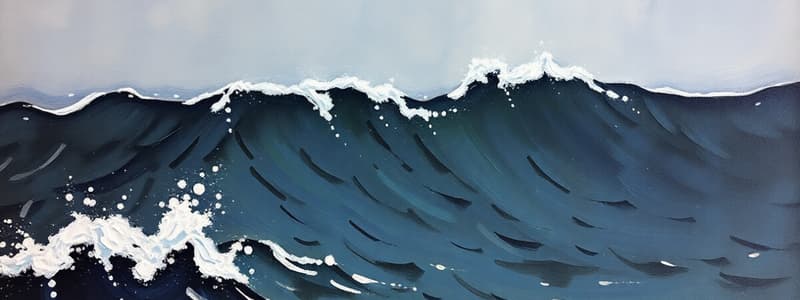Podcast
Questions and Answers
A wave is a regular sequence of what?
A wave is a regular sequence of what?
pulses
What are the two types of wave motions, namely in a string or spring, and sound waves?
What are the two types of wave motions, namely in a string or spring, and sound waves?
- Sound waves
- Longitudinal waves (correct)
- Transverse waves (correct)
- Circular waves
A transverse wave is a wave in which the disturbance is perpendicular to the propagation direction of the wave.
A transverse wave is a wave in which the disturbance is perpendicular to the propagation direction of the wave.
True (A)
What is the center line of the wave called?
What is the center line of the wave called?
What is the highest point of the wave called?
What is the highest point of the wave called?
Two points on a wave move in phase when they move in the same direction at the same speed and have the same displacement from the position of rest.
Two points on a wave move in phase when they move in the same direction at the same speed and have the same displacement from the position of rest.
What is the distance between two crests or two troughs of one wavelength called?
What is the distance between two crests or two troughs of one wavelength called?
What is the frequency of a wave measured in?
What is the frequency of a wave measured in?
The time it takes to complete one wave (full wave) is measured in what?
The time it takes to complete one wave (full wave) is measured in what?
The relation between the frequency (f) and period (T) is represented by: f = ______
The relation between the frequency (f) and period (T) is represented by: f = ______
What is the speed of a wave calculated by making use of the wave equation?
What is the speed of a wave calculated by making use of the wave equation?
What is the distance between 19 constructive compressions (measured in the middle of each compression) of a longitudinal wave called?
What is the distance between 19 constructive compressions (measured in the middle of each compression) of a longitudinal wave called?
In the speed of a longitudinal wave, the particles in the medium undergo a to and fro motion, we say that the particles vibrate in the direction wherein the longitudinal wave propagates, The speed of the wave itself. Because the particles of the medium (for example in the spiral) and the speed of the wave itself. Because the particles of the medium undergo a to and fro motion, we say that the particles vibrate in the direction wherein the longitudinal wave propagates, the speed of the wave itself. Because the particles of the medium undergo a to and fro motion, we say that the particles vibrate in the direction wherein the longitudinal wave propagates., The speed of the wave itself.
In the speed of a longitudinal wave, the particles in the medium undergo a to and fro motion, we say that the particles vibrate in the direction wherein the longitudinal wave propagates, The speed of the wave itself. Because the particles of the medium (for example in the spiral) and the speed of the wave itself. Because the particles of the medium undergo a to and fro motion, we say that the particles vibrate in the direction wherein the longitudinal wave propagates, the speed of the wave itself. Because the particles of the medium undergo a to and fro motion, we say that the particles vibrate in the direction wherein the longitudinal wave propagates., The speed of the wave itself.
What does part A, C, E and G represent in the diagram of the spring?
What does part A, C, E and G represent in the diagram of the spring?
What is the layout of the coils in the spring in the part A, C, E and G?
What is the layout of the coils in the spring in the part A, C, E and G?
Flashcards
Frequency (f)
Frequency (f)
The number of compressions or rarefactions that pass a given point in one second, measured in Hertz (Hz).
Period (T)
Period (T)
The time it takes for one complete wave to move past a point, measured in seconds (s).
Speed of a Longitudinal Wave (v)
Speed of a Longitudinal Wave (v)
The speed at which a longitudinal wave travels through a medium, calculated using the equation: Speed = Frequency × Wavelength, or v = fλ
Wavelength of a Longitudinal Wave (λ)
Wavelength of a Longitudinal Wave (λ)
Signup and view all the flashcards
Wave
Wave
Signup and view all the flashcards
Transverse Wave
Transverse Wave
Signup and view all the flashcards
Equilibrium Position
Equilibrium Position
Signup and view all the flashcards
Crest
Crest
Signup and view all the flashcards
Trough
Trough
Signup and view all the flashcards
In Phase
In Phase
Signup and view all the flashcards
Out of Phase
Out of Phase
Signup and view all the flashcards
Wavelength (λ)
Wavelength (λ)
Signup and view all the flashcards
Frequency (f)
Frequency (f)
Signup and view all the flashcards
Period (T)
Period (T)
Signup and view all the flashcards
Frequency and Period Relationship
Frequency and Period Relationship
Signup and view all the flashcards
Interference
Interference
Signup and view all the flashcards
Constructive Interference
Constructive Interference
Signup and view all the flashcards
Destructive Interference
Destructive Interference
Signup and view all the flashcards
Amplitude
Amplitude
Signup and view all the flashcards
Longitudinal Waves
Longitudinal Waves
Signup and view all the flashcards
Pulse
Pulse
Signup and view all the flashcards
Rest Position (Equilibrium)
Rest Position (Equilibrium)
Signup and view all the flashcards
Amplitude
Amplitude
Signup and view all the flashcards
Pulse Length
Pulse Length
Signup and view all the flashcards
Pulse Speed
Pulse Speed
Signup and view all the flashcards
Positive Pulse
Positive Pulse
Signup and view all the flashcards
Negative Pulse
Negative Pulse
Signup and view all the flashcards
Propagation Direction
Propagation Direction
Signup and view all the flashcards
Transverse Pulse
Transverse Pulse
Signup and view all the flashcards
Study Notes
Frequency
- The frequency (f) is the number of compressions or rarefactions that pass a given point in one second and is measured in hertz (Hz).
Period
- The period (T) of a longitudinal wave is the same as with a transverse wave; the time that it takes for one complete wave (one wavelength) to move past a point and is measured in second (s).
- Thus (f) frequency and (T) period: f = 1/T and T = 1/f
Speed of a Longitudinal Wave
- We must distinguish between the speed of the particles in the medium (for example in the spiral) and the speed of the wave itself. Because the particles in the medium undergo a to and fro motion, we say that the particles vibrate in the direction wherein the longitudinal wave propagates. Therefore, the particles also change as they move still in the same direction to the maximum speed displacement from their original position. The particles change direction and accelerates back to the position of rest in one direction and then move back to the position of rest again and accelerates into the opposite direction of displacement. The particles change direction again and accelerates back to the position of rest.
- The speed (v) of a longitudinal wave can be calculated by making use of the wave equation.
- Speed = frequency × wavelength or in symbol form v = fλ
Example 1
-
The distance between 19 consecutive compressions (measured in the middle of each compression) of a longitudinal wave is 720 mm while the compressions move a distance of 800 mm in 5 s. Calculate: (1) the speed of the propagated waves (2) the wavelength (3) the frequency of the wave.
-
Solution: (1) v = D/t = 800 mm/5 s = 0.8 m/s (2) The wavelength is the length of one complete wave λ = 720 mm/18 = 40 mm = 0.04 m (3) v = fλ ➞ f = v/λ = 0.16 m/s / 0.04 m = 4 Hz
Studying That Suits You
Use AI to generate personalized quizzes and flashcards to suit your learning preferences.





